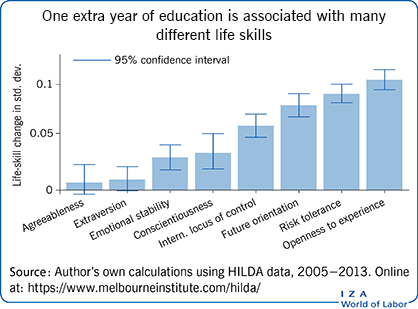Elevator pitch
Life skills, sometimes referred to as noncognitive skills or personality traits (e.g. conscientiousness or locus of control—the belief to influence events and their outcomes), affect labor market productivity. Policymakers and academics are thus exploring whether such skills should be taught at the high school or college level. A small portfolio of recent studies shows encouraging evidence that education could strengthen life skills in adolescence. However, as no uniform approach exists on which life skills are most important and how to best measure them, many important questions must be answered before life skill development can become an integral part of school curricula.

Key findings
Pros
Adolescence offers a window of opportunity to teach life skills when the human brain is malleable.
Recent studies show that life skills can be boosted in adolescence through education or education interventions.
There is consistent evidence of a positive impact of education on extraversion and behavioral proxies of life skills.
The estimated impact of education initiatives on life skills is modest, though it is comparable to the effect of early childhood programs.
Cognitive behavioral therapy may be a promising tool for life skill development.
Cons
General conclusions from the small evidence base are not possible because of the broad diversity in measuring skills and education.
Studies that evaluate specific life skill interventions rely on invalidated behavioral proxies, and are thus less reliable.
Some studies even report negative impacts of education on life skill development, raising concerns about correct measurements of skills.
Empirical evidence on the (cost-)effectiveness of concrete interventions is scarce.
The evidence base is too limited to effectively inform policymakers on the implementation of life skill development in school curricula.